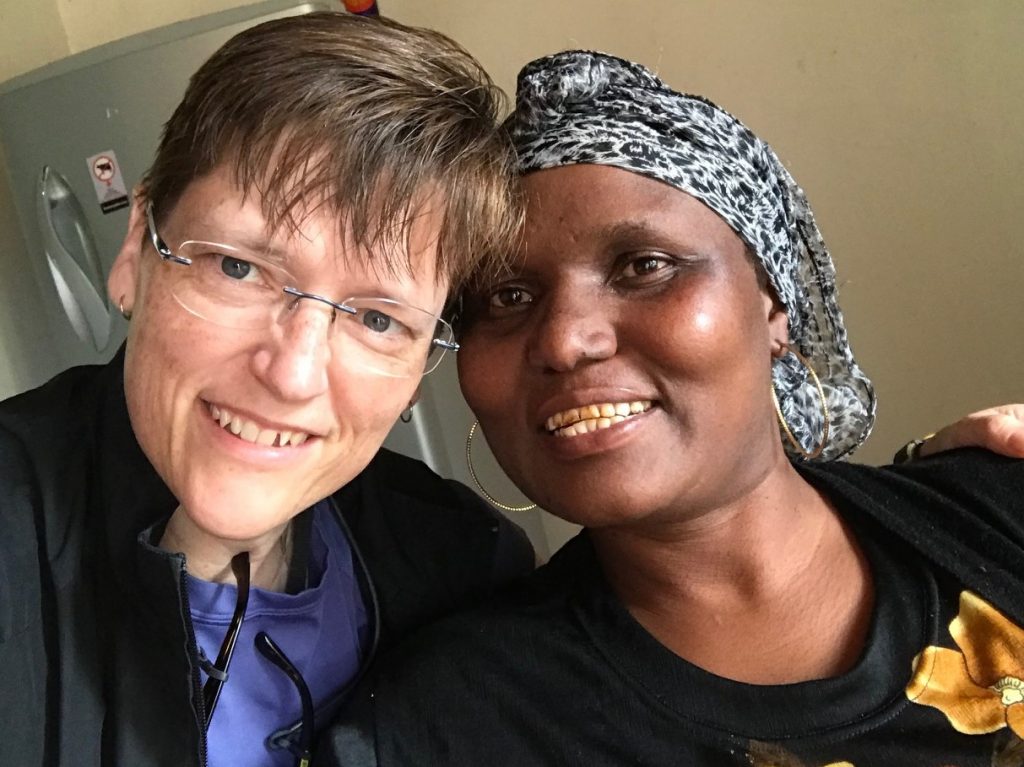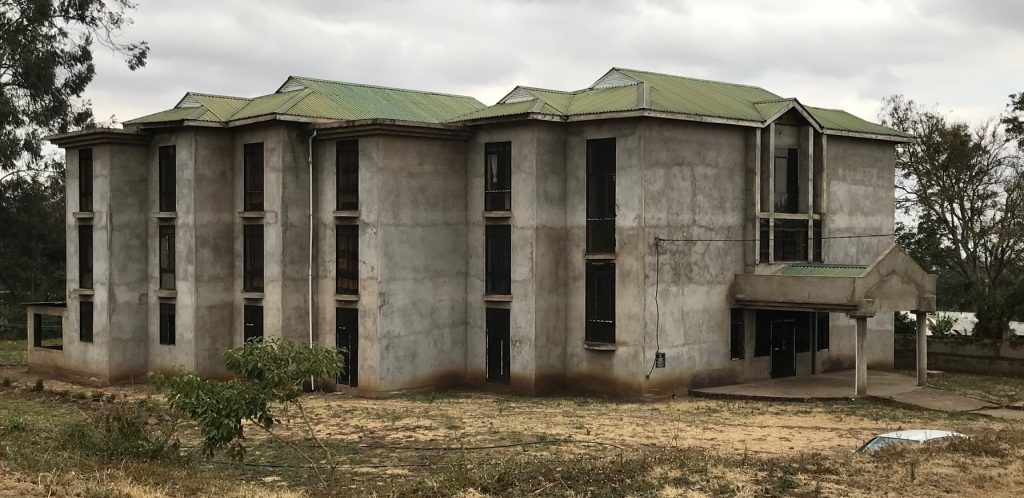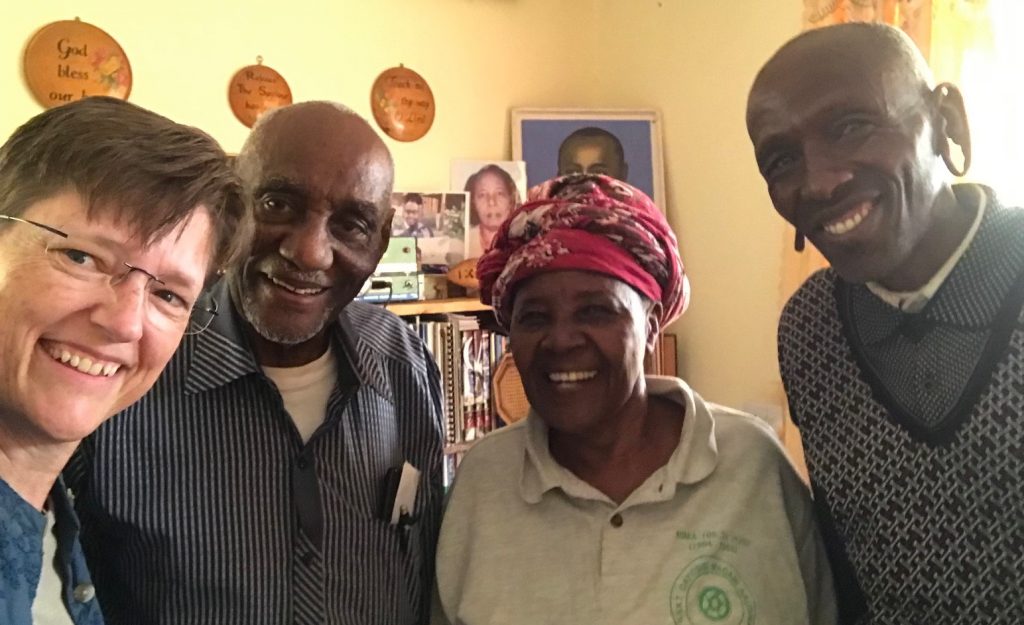Did you ever play sardines in your youth group—if you were connected to the church when growing up? It is a game like hide and seek, but all but the seekers cram into one small space and wait to be found. Well, today I was crammed into one van from Tumaini University to Arusha, then crammed even more into another van from Arusha to Meserani. I was standing, but I couldn’t stand full height, and the guy to my right had his arm around me the whole way (perhaps 40 minutes!?!), holding onto the grab bar over my left shoulder. It wasn’t creepy but just a bit uncomfortable standing scrunched over. Then, I got a seat for the 14 km to Monduli, though my knees were between the knees of the two men I was sitting across from. There is really a different sense of personal space here!
This was my first trip to Monduli since arriving, the village where I lived for 3 years. So many wonderful memories filled my mind. I first stopped to see beloved Rebecca. She was the cook and day guard for my missionary colleagues, Jean and Marvin.

I forgot to take a picture today, so here is one from my last visit, Feb. 2020 .
Rebecca is a wonderful cook and owns a bakery. I had hoped to buy bread today, but she said that the electricity has been so unstable—going out during the baking process—that they had to throw away so much unbaked/under-baked bread that it was too costly to bake! It is the end of the long dry season before the short rains (usually November and December). So, my guess is that there is too little water to sustain the hydro electric plants, and there is no system for scheduled “brown outs” so that people can plan accordingly.
A couple nights ago, I felt so fortunate that I hit the “publish” button on my blog just before the power went out! Just a short time later, the power came on again, and I had just boiled water to do my dishes before the power went out again. As I have an on-demand hot water heater, it is better to just boil water to mix with the tap water for washing in warm water, which is also used for rinsing the dishes in boiled water, because the tap water is not potable.
I made plans with Rebecca for a visit to stay a few days after my Kiswahili course for immersion Kiswahili. After a nice visit with Rebecca, I walked up to the Monduli church where Pastor Nangole was going to pick me up.
I saw the Monduli Lutheran Guesthouse, where the Wartburg Theological Seminary Group will stay in January.

Here’s the guesthouse!
Then, Pastor Nangole drove me up the base of the Monduli mountains where he lives. We had a lovely lunch, and I presented the Marie Curie fellowship project framework to him. I told him that the project was designed to be shaped and developed in a participatory/collaborative way with Maasai stakeholders, who will determine the core values and learning outcomes that integrate a biblical-ecotheology (with a Maasai hermeneutic/interpretive approach), traditional Maasai knowledge of caring for the creation, and best practices of climate change adaptation and mitigation that are culturally specific for the more traditional areas of Maasailand.
Pastor Nangole has known me since 2002. And he knows my history working with the Maasai, because collaborated with him. He nicknamed me “kono kono” (snail), because it took me a while to return with my church and the support to bless Maasai and Sonjo churches in the area where he was District Pastor, yet everywhere I go, I leave a trail of blessing. My church in Bellevue, WA, made 3 trips with 6 groups in partnership with Pastor Nangole and under his leadership. These were amazing experiences with some amazing stories to tell. Here’s one:
One of the places we visited with Pastor Nangole was Esoit Sambu, way up in the north and not too far from the Serengeti National Park’s northeast gate. We had greeted each other and were inside the stick, mud, and cow dung church. There were some gaps in the walls with sunlight peeking through, and there were children peeking through the windows. One of the evangelists (lay pastors, for whom I have such great respect) was praying for us in Kimaasai, which was translated into English for us. It was profound—even in translation—and filled with words that knit us together as siblings in Christ. As he prayed, a light yet short rain began with raindrops pattering upon the corrugated tin roof. “God has come!” This is what the Maasai say when it rains. Rain, especially in this area of the savannah, is a blessing, because it is what nurtures the grass that feeds the cattle that sustain the lives of pastoralist Maasai. And it rained just when the evangelist was praying. One may think, what a coincidence. Yet, this was the dry season when it doesn’t rain for months!

Pastor and Mama Nangole and an evangelist from Esoit Sambu (a different one than in the story)
This was an important visit, because Pastor Nangole knows me as one who brings blessings (as we traveled with him for those 6 church visits and also connecting with him for the 2 university/college groups I facilitated). Many scholars have come to Tanzania to do their research in order to get a PhD or whatever. Few find ways to continue the relationships and give back—a sort of extractive researcher. Perhaps, because my relationships and partnership started before my PhD, it was natural to continue the relationships after the PhD. This is also one of the values that my doctor father, Knut Holter, holds and models.
My local collaborator, Prof. Parsalaw, knows of me. And he is a very important Tanzanian supervisor as a Maasai elder, scholar, and Vice Chancellor of Tumaini University Makumira. This is one of the critical (Providential!) resources needed for this project to even work. However, Pastor Nangole knows me as a friend and trusts me. So, Pastor Nangole can introduce me more meaningfully to Prof. Parsalaw. In addition, when the new bishop is elected, he will take me to the new Bishop of the North Central Diocese of the Lutheran Church in Tanzania for another very important introduction. I will ask for the blessing of the bishop before I approach any of the ELCT churches or schools to ask them to be a research site. So, this was an important day to discuss the project with Pastor Nangole and right away ask for his input to shape the project.
And I survived 5 dala dala rides! (There are no seat belts!)
Mungu akubariki! (God bless you!)
I love the snail analogy!!